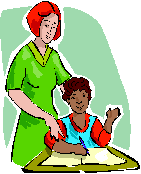|
HOW TO PARENT SO TOP TEN LIST Although there are many variations of “right” ways to parent and your personal family values should be your guide, there are some basic principles that underlie good parenting. With the complexion of our media-driven culture, it is particularly important for families to embrace these foundational principles. In my book How to Parent So Children Will Learn I emphasize the supportive concepts that can help parents raise happy, resilient, and achieving children. I’ve developed a Top Ten List to summarize these essential principles to assist parents. My book is now in its third edition and has been awarded a National Best Book Award by USA Book News in the Parenting and Family category. I know you’ll find it helpful for raising your families.
Praise conveys your values to your children and sets expectations for them. Lack of praise conveys the message that you don’t believe in them. Reasonable praise, like good thinker, hard worker, smart, creative, strong, kind, and sensitive, sets high but reasonable expectations that are within your children’s reach. Words like perfect, the best, natural athlete, most beautiful, and brilliant can set impossible expectations. Children internalize those expectations, and the expectations become pressures when children find they can’t achieve those high, impossible goals. 2. Don’t discuss children’s problem behaviors within their earshot (referential speaking).
3. Take charge; don’t overempower your children.
These children feel as if you’re taking away their freedom when you set reasonable limits. They expect to be treated as adults before they’re ready. In my research on over 5,000 middle-grade students, many children believed they should have equal decision-making power as their parents. In adolescence, the ordinary limits cause overempowered children to become angry, depressed, and rebellious because they feel powerless compared to the power they experienced too early. 4. Build resiliency; don’t rescue your child from reality. Although children need protection, overprotection encourages dependency and oversensitivity. The V of Love must expand its limits as children mature. You can be kind without being overly sympathetic. You can do for children without overdoing. Your children will need to learn to recover from losses and failures, without being rescued from reality. Developing resiliency will permit them to triumph over obstacles. 5. Stay united, be willing to compromise, and say good things about your child’s other parent. Leaders in a family that lead in two opposite directions confuse children. Children will not respect parents who show no respect for each other. Describing your child’s other parent as an “ogre” or “dummy” may make you feel like a good and understanding parent temporarily, but sabotaging another parent, or grandparent, will backfire, and your child will no longer respect either of you. This is especially hard after divorce, but it’s even more important in divided families. Parents and grandparents being united is important for children. 6. Hold teachers, education, and learning in high regard. Set your children’s education as first priority. That will become most clear if they hear how much you value learning. Tell them about the best teachers you had and elevate their teachers as well. Set expectations for higher education early so they will assume education does not stop after high school. 7. Be positive about your own work and that of your child’s other parent. If you arrive home and complain about your work daily, your children will become antiwork kids. They’ll complain about their schoolwork and household chores. If you don’t like your work, attempt to find better work, and remind them that education provides more job choices. Try hard to keep balance of work and family fun in your lives.
Your children are watching you. When you “get away with” speeding, keep too much change, or are disrespectful to your parents (their grandparents), they’ll notice. When you’re interesting and energetic they’ll be equally impressed. You can be a good role model without being perfect, but your imperfections are showing. You don’t have to do it all. Introduce your children to friends and potential mentors who also will be positive influences.
Too many parents of 20-year-olds have sobbed in my office because they didn’t find time for their children when they were growing up. Make time for learning with your kids and they’ll be learners forever. Enjoy and develop interests together and you’ll not have regrets, only wonderful memories. 
10. Keep a separate fun time and adult status without giving your children adult status too soon. Enjoy adult life without your children. Weekly dates and a few adult vacations a year will keep you excited about life. Give your children something to look forward to. They can watch and wait and do child activities with the family. Kids who get adult privileges too soon have power beyond their maturity. 1Adapted from How to Parent So Children Will Learn (3rd Edition, Great Potential Press, 2008). ©2010 by Sylvia B. Rimm. All rights reserved. This publication, or parts thereof, may not be reproduced in any form without written permission of the author. |
©2010 by Sylvia B. Rimm. All rights reserved.
Report any problems with this site to Webmaster@sylviarimm.com




 8. Be a role model of ethics, activity, and hard work. Locate other good role models for your children.
8. Be a role model of ethics, activity, and hard work. Locate other good role models for your children.